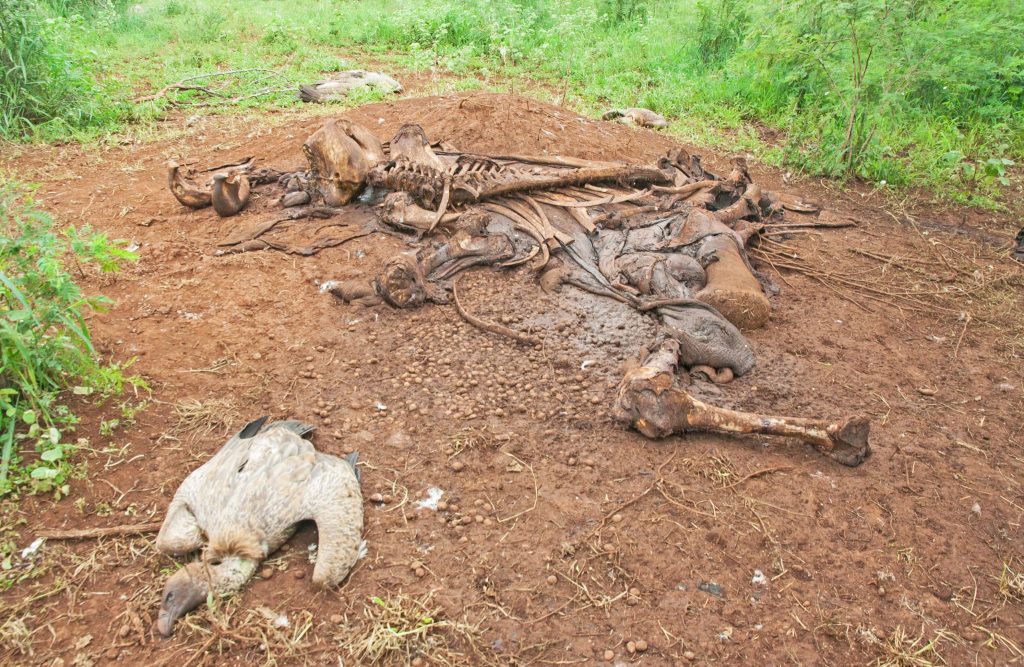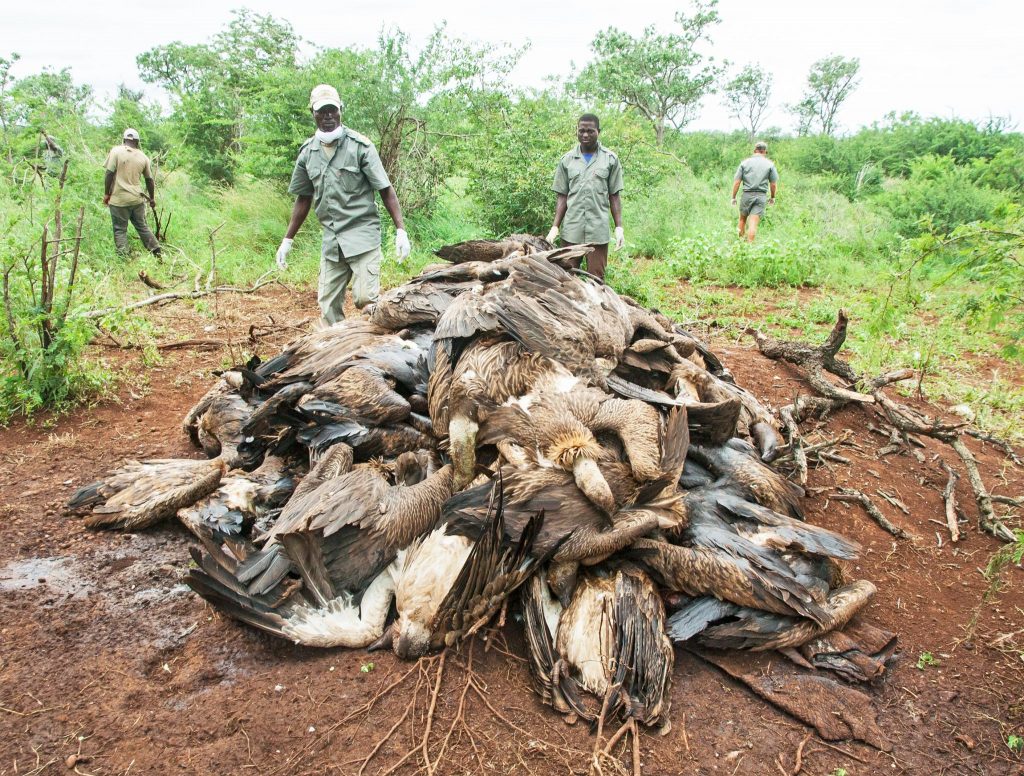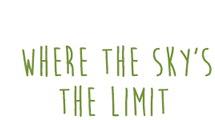

The shocking news about the intentional and targeted poisoning of an elephant carcass that affected 121 Critically Endangered vultures on 25 February 2018 in southern Mozambique is distressing but not surprising. These incidents are becoming more frequent. The impact of this event is devastating, however it is important to realise that without a quick response the mortalities would have been much greater.
Of the 121 affected vultures, 18 were recovered poisoned but still alive and these are all undergoing treatment. The rapid action taken by the poison response team neutralised the poisoned carcass and prevented many of the hundreds of vultures seen in the area plus other scavenging animals from a death via poisoning. Research by the Hawk Conservancy Trust’s Head of Conservation and Research, Dr Campbell Murn, has demonstrated that a quick response by poison response teams will significantly reduce deaths and minimise the loss of wildlife and contamination of the environment.


The killing of wildlife by poisoning is very difficult to prevent, but a fast response to poisoning events limits their impact. Working in partnership, the Hawk Conservancy Trust, the University of Reading and the Endangered Wildlife Trust deliver a training programme on the effective neutralisation of poisoning events and also provide poison response kits to field personnel in southern Africa.
A lot more poison response training is required, and we have identified key areas and poisoning hotspots where urgent work is needed to enable stakeholders in these areas to adequately plan for and manage incidents when they occur.
Vultures are in severe decline and the situation is now critical. Africa is fast losing its vultures, and with them the important and highly efficient ecosystem services they provide. Without scavengers, carcasses are left to rot and potential for disease increases for both humans and wildlife.
It cannot be overlooked that the most significant underlying issue is illegal elephant poaching, and as long as there is elephant poaching, vultures are at risk. However, elephants already have a huge support network, which is having a positive impact on elephant conservation.
Vultures cannot wait for the underlying issue to be resolved. Immediate action is needed and we are here to help vultures because without effective intervention when poisoning occurs, they will become extinct. Our ability to supply the training and kits needed across this region is limited by our resources and so we are asking for your support to expand these vital skills and equipment into the key areas where we can play our part together in preventing the extinction of these vital birds.
| Cookie | Duration | Description |
|---|---|---|
| cookielawinfo-checkbox-advertisement | 1 year | Set by the GDPR Cookie Consent plugin, this cookie is used to record the user consent for the cookies in the "Advertisement" category . |
| cookielawinfo-checkbox-analytics | 11 months | This cookie is set by GDPR Cookie Consent plugin. The cookie is used to store the user consent for the cookies in the category "Analytics". |
| cookielawinfo-checkbox-functional | 11 months | The cookie is set by GDPR cookie consent to record the user consent for the cookies in the category "Functional". |
| cookielawinfo-checkbox-necessary | 11 months | This cookie is set by GDPR Cookie Consent plugin. The cookies is used to store the user consent for the cookies in the category "Necessary". |
| cookielawinfo-checkbox-others | 11 months | This cookie is set by GDPR Cookie Consent plugin. The cookie is used to store the user consent for the cookies in the category "Other. |
| cookielawinfo-checkbox-performance | 11 months | This cookie is set by GDPR Cookie Consent plugin. The cookie is used to store the user consent for the cookies in the category "Performance". |
| viewed_cookie_policy | 11 months | The cookie is set by the GDPR Cookie Consent plugin and is used to store whether or not user has consented to the use of cookies. It does not store any personal data. |
| _GRECAPTCHA | 5 months 27 days | This cookie is set by the Google recaptcha service to identify bots to protect the website against malicious spam attacks. |
| Cookie | Duration | Description |
|---|---|---|
| player | 1 year | Vimeo uses this cookie to save the user's preferences when playing embedded videos from Vimeo. |
| ServerPool | session | This cookie is set by the provider Tripadvisor. This cookie is used for user tracking and viewing embedded contents from TripAdvisor like payment of referral commission fees etc. |
| sp_landing | 1 day | The sp_landing is set by Spotify to implement audio content from Spotify on the website and also registers information on user interaction related to the audio content. |
| sp_t | 1 year | The sp_t cookie is set by Spotify to implement audio content from Spotify on the website and also registers information on user interaction related to the audio content. |
| TASession | session | This cookie is set by the provider Tripadvisor. This cookie is used for user tracking and viewing embedded contents from TripAdvisor like payment of referral commission fees etc. |
| TASSK | 5 months 27 days | This cookie is set by the provider Tripadvisor. This cookie is used for viewing embedded contents to the visitor from Tripadvisor. It also helps to know whether the visitor had clicked on the advertisement, to collect payment from the Tripadvisor. |
| TATravelInfo | 14 days | This cookie is set by the provider Tripadvisor. This cookie is used for viewing contents and ads from Tripadvisor, which in return helps to earn money from Tripadvisor if the visitor has clicked the ads. |
| __cf_bm | 30 minutes | This cookie, set by Cloudflare, is used to support Cloudflare Bot Management. |
| Cookie | Duration | Description |
|---|---|---|
| sync_active | never | This cookie is set by Vimeo and contains data on the visitor's video-content preferences, so that the website remembers parameters such as preferred volume or video quality. |
| __smVID | 1 month | Sumo sets this cookie for sign-up prompt purposes when visitors visit a website. |
| Cookie | Duration | Description |
|---|---|---|
| CONSENT | 2 years | YouTube sets this cookie via embedded youtube-videos and registers anonymous statistical data. |
| TADCID | 10 years | Tripadvisor sets this cookie to store a unique ID for users, to help them view embedded content from Tripadvisor. |
| vuid | 2 years | Vimeo installs this cookie to collect tracking information by setting a unique ID to embed videos to the website. |
| _ga | 2 years | The _ga cookie, installed by Google Analytics, calculates visitor, session and campaign data and also keeps track of site usage for the site's analytics report. The cookie stores information anonymously and assigns a randomly generated number to recognize unique visitors. |
| _gat_gtag_UA_20364160_1 | 1 minute | Set by Google to distinguish users. |
| _ga_1MTNP1Z1FC | 2 years | This cookie is installed by Google Analytics. |
| _gid | 1 day | Installed by Google Analytics, _gid cookie stores information on how visitors use a website, while also creating an analytics report of the website's performance. Some of the data that are collected include the number of visitors, their source, and the pages they visit anonymously. |
| Cookie | Duration | Description |
|---|---|---|
| fr | 3 months | Facebook sets this cookie to show relevant advertisements to users by tracking user behaviour across the web, on sites that have Facebook pixel or Facebook social plugin. |
| SRT | session | This cookie is set by the provider Tripadvisor. This is a Tripadvisor session cookie used for advertising purposes. |
| TACds | 2 months | This cookie is set by the provider TripAdvisor. This cookie is used for showing travel information and ads based on the user preferences. |
| TART | 5 days | This cookie is set by the provider Tripadvisor. This cookie is used for viewing contents and ads from Tripadvisor, which in return helps to earn money from Tripadvisor if the visitor has clicked the ads. |
| TAUD | 14 days | This cookie is set by the provider Tripadvisor. This is Tripadvisor session cookie used for advertising purposes. |
| TAUnique | 2 years | This cookie is set by the provider TripAdvisor. This cookie is used for showing travel information and ads based on the user preferences. |
| VISITOR_INFO1_LIVE | 5 months 27 days | A cookie set by YouTube to measure bandwidth that determines whether the user gets the new or old player interface. |
| YSC | session | YSC cookie is set by Youtube and is used to track the views of embedded videos on Youtube pages. |
| yt-remote-connected-devices | never | YouTube sets this cookie to store the video preferences of the user using embedded YouTube video. |
| yt-remote-device-id | never | YouTube sets this cookie to store the video preferences of the user using embedded YouTube video. |
| yt.innertube::nextId | never | This cookie, set by YouTube, registers a unique ID to store data on what videos from YouTube the user has seen. |
| yt.innertube::requests | never | This cookie, set by YouTube, registers a unique ID to store data on what videos from YouTube the user has seen. |
| _fbp | 3 months | This cookie is set by Facebook to display advertisements when either on Facebook or on a digital platform powered by Facebook advertising, after visiting the website. |
| Cookie | Duration | Description |
|---|---|---|
| loglevel | never | No description available. |
| PMC | 2 years | No description |
| TASID | 30 minutes | No description |
| _dc_gtm_UA-20364160-1 | 1 minute | No description |
| __smSessionId | 9 hours | No description available. |
| __smToken | 1 year | This cookie is set by the Sumo. This cookie is used for verifying whether the user is logged in or not. |
| __vt | 1 hour | No description |




